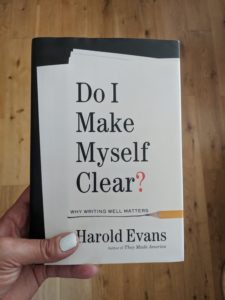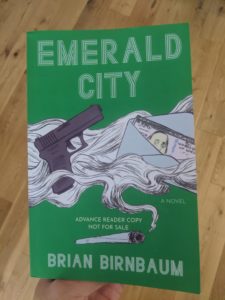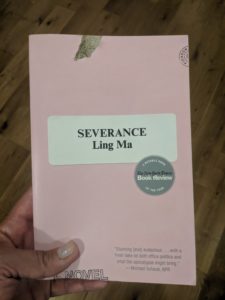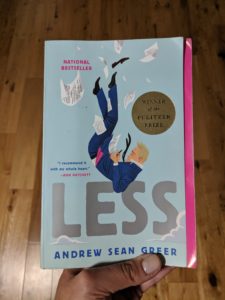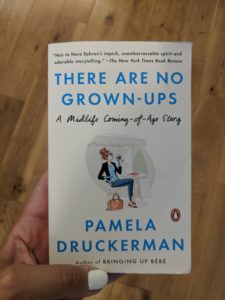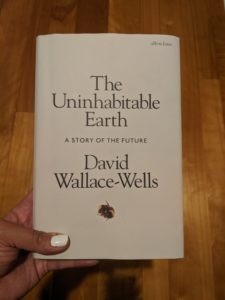Four Stars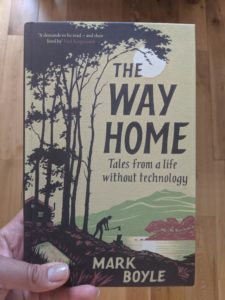
Best for:
People interested in what it looks like to truly, deeply, live one’s values.
In a nutshell:
Mark Boyle once lived without money for three years. Now he’s gone further – he’s given up everything we would consider to be modern technology. (But how is there a book, you ask? We’ll get there.)
Worth quoting:
‘What are we prepared to lose, and what do we want to gain, as we fumble our way through our short, precious lives.’
Why I chose it:
For the past couple of years I’m been very interested in life that is closer to nature, especially as it relates to environmental impact. Plus, this is a hefty and gorgeous book.
Review:
Spoilers for the TV Show The Good Place throughout.
For my CBR review post I chose a Chidi quote from The Good Place: ‘Principles aren’t principles when you pick and choose when you’re gonna follow them.’ In fact, throughout my read of this book I kept thinking of that show; specifically the twists in the third season, where we discover that no one has gotten into the Good Place for 500 years because it’s just too damn hard to make the right decisions.
I think even having strong, well-thought-out principles is rare. Religion may give it to some people, but even then, what does it really mean to, for example, love your neighbor as yourself? Or do no harm? How far are you willing — and able — to go in living your values? I’ve seen the phrase ‘there’s no ethical consumption in capitalism’ shared on social media often. I mean, I’m typing this on a computer that is slowly dying; if I want to buy another one, what company do I support? The one that gives no money to charity and built a giant new headquarters without considering including childcare facilities (Apple), or the one that supplies computers to the US agency currently keeping immigrant children in cages (Dell)?
Not great choices, eh? If we want to truly live a low-harm life, can we life the lives so many of us in industrialized nations are living? And if not, what does our life look like?
Author Mark Boyle wants to live by his principles, at least, as far as I can tell. He doesn’t elaborate on what those principles are in a list or any specific way, but he seems to generally want to live what he considers a real life – one that is closer to nature and a way to experience true connection to the earth. Which is amazing, but I think it is narrow-minded to suggest that this is the true way to live a good life. I don’t get the sense from Boyle that he believes everyone must live as he lives, but I do get the sense that he believes he is more connected to the idea of what it means to be human than, say, someone using a computer. I find that mildly amusing.
There are many eye-roll moments, but honestly not as many as there could be. And the storytelling itself is interesting. Boyle breaks down his first year of no tech (hand-tools only, no car, no electricity, no running water, no screens) by season, sharing the work he has to do to keep his sharehold land and cabin functioning. He grows his own food, catches his own meat (which he does grapple with as a former vegan). He doesn’t make his own clothes yet, and he does things like hitchhike if he needs to travel far. He doesn’t use a phone, which means he’s only reachable by letters.
And I think that’s where I do get a little annoyed with Boyle. Not because he’s choosing to live this life, but because he’s pushed it onto others secondarily. And that’s totally fine — other people aren’t required to approve of or participate in how I live my life — but when the only way a parent can reach their child with serious news is via letter, I think that’s kind of uncool. Yes, I realize that this is how it used to be before any phones were available, but it’s not how it has to be now.
I don’t agree that living without technology necessarily makes one closer to understanding what it means to be human, and I don’t think living with technology means one is necessarily disconnected. There are extremes in both ways of viewing the world. I don’t believe that camping is objectively better or worse than sleeping in a bed. But at the same time, I do understand that while the ends might be fine (being able to talk to my parents who are currently 6,000 miles away), the means can be problematic (how did the materials needed to make my phone get there). I mean, I gave up eating meat because I couldn’t come up with a way, given my currently life circumstances, to rationalize it, but I do see why Boyle does choose meet.
There’s a lot to think about with this book. How can we be closer to who we want to be? What does it mean to live this life? Are we living it deeply? And, obviously, who gets the luxury right now of moving to a bit of land in rural Ireland and living completely off the grid? We didn’t all spring forth with endless options around us when born – we may have intergenerational debt or trauma or cultural expectations or family relationships that can’t just be ignored or even processed by vowing to give up email.
I’ll be thinking about this book for awhile.
Keep it / Pass to a Friend / Donate it / Toss it:
Keep it
